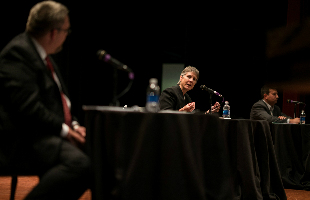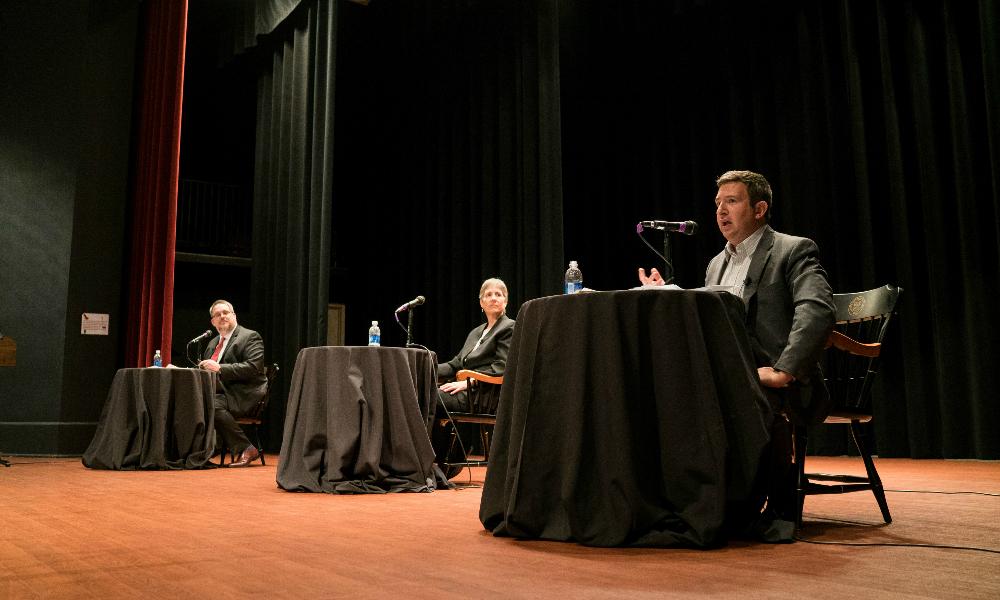Evolution versus Revolution
A debate on what is or is not necessary to fight terrorism
Nation and WorldSUMMARY: Guest experts Josh Zive and Daveed Gartenstein-Ross debated whether or not the government needs to undergo radical change to combat terrorism in the second Madison Vision Series presentation of the 2016-17 school year.
In preparation for the approaching presidential election, the Madison Vision Series hosted two experts, Josh Zive and Daveed Gartenstein-Ross, in a debate on national security. Zive is senior counsel for Bracewell Law and Gartenstein-Ross is senior fellow for the Foundation for the Defense of Democracies. Both are skilled debaters and have deep expertise in national and foreign policy. In the spirit of civil discourse, they respectfully sparred on whether radical change is necessary to confront terrorism.
|
"The willingness to come together and debate on a topic is maybe the most cooperative type of engagement that we can undertake..." -Mike Davis, director of JMU Debate |
Zive argued that radical change is not necessary because our democratic system is both flexible enough to adapt and steady enough to weather challenges and missteps. He urged that we not give into pessimism and cautioned against changing a system that has worked for 200 years because of fear of terrorism. He also reminded the crowd that as Americans we have a collection of rights that protect our citizens and radical change can diminish these rights. He cited the Japanese internment camps on American soil during World War II or McCarthyism during the Cold War as examples of infringements upon these rights.
 |
| Both debate participants made initial presentations of seven minutes each, followed by five-minute rebuttals. They then answered audience questions and concluded with a five-minute response. Cynthia Bauerle, dean of the College of Science and Mathematics, moderated the event. |
Gartenstein-Ross asserted that technology is moving faster than our government can adapt. He sees an analogy between the government to Blockbuster or Borders, two seemingly unthreatened legacy businesses in the 20th century, now bankrupt because they did not adapt to changing times. He argued that if we adapt and change to more thoroughly understand complex issues, including root issues like climate change, water crisis and violent non-state actors, then less people will be hurt and dissatisfied with the system. He prescribes that the government have more accountability and transparency by having “start-up” cells, like those in Silicon Valley, to compete with the flexibility of terrorist organizations and change the architecture to fit the complex issues of the 21st century.
In response, Zive said that the government is not Blockbuster, Borders or a business at all and that the flexibility enjoyed by businesses and violent non-state actors is the result of not having adhered to democratic principles. He asserts that we have made strides over time working through the existing system to fight terrorism, while also bolstering international cooperation and protecting core democratic principles.
|
"We have a calling in higher education...to model and engage in civil discourse and debate in democratic society where we can learn from and with each other." -President Jonathan Alger |
In rebuttal, Gartenstein-Ross argued that radical change, such as debureaucratization and increased accountability and transparency, would not only not infringe on fundamental American rights, but would equip us to more effectively combat terrorism. Gartenstein-Ross voiced concern that the U.S. has made policy decisions that have resulted in the deaths of thousands of people, and warned that if our nation doesn’t change with the times, then more people will die.
Both parties made strong arguments and answered thoughtful audience questions about whether the U.S. has already endured radical change, the definition of terrorism, and proposed policy. In an a very close audience vote, Zive was declared the winner of the debate, with many agreeing that radical change is not necessarily key to combating terrorism.

